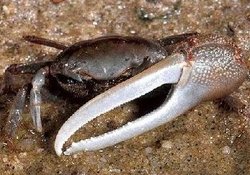Fiddler Crabs
|
|
| Fiddler crab | ||||||||||||||
|---|---|---|---|---|---|---|---|---|---|---|---|---|---|---|
 Uca pugnax | ||||||||||||||
| Scientific classification | ||||||||||||||
| ||||||||||||||
| Subgenera and Species | ||||||||||||||
|
Note: A separate disambiguation page exists for the initials UCA.
A fiddler crab may be any of approximately 97 species of semi-terrestrial marine crabs within the genus Uca. Belonging to the family Ocypodidae, fiddler crabs are most closely related to the ghost crabs of the "sister genus" Ocypode.
Found in mangroves and on sandy or muddy beaches of West Africa, the Western Atlantic, Eastern Pacific and Indo-Pacific, fiddler crabs are easily recognized by their distinctively asymmetric claws. It is the males which boast an oversized claw or cheliped; it plays a role in courtship and signalling among conspecifics. The movement of the smaller claw during feeding, from the ground to the mouth, inspired the crabs' common name; to many, it appears as if the animal is playing a fiddle (the larger claw).
Reaching a diameter of between 2.2-4.5 centimetres (1-2 inches), fiddler crabs may be tan, blue-green, turquoise, black, yellow, or orange in colour. Diurnal animals, the fiddler crabs are actually a darker colour by day than they are by night. They are an important source of food for shore birds and other animals inhabiting salt marshes. The crabs make burrows up to 60 centimetres (23 inches) deep in the muddy substrate where they retreat to during high tides. When the tide is out, fiddler crabs tirelessly scurry side-ways along the beach as they comb the sands for edibles.
Fiddler_crab_burrows.jpg
The crab's smaller claw picks up a chunk of sediment and brings it to the mouth, where its contents are sifted through. After anything edible is salvaged, be it algae, microbes, fungus, or other decaying detritus, the sediment is replaced in the form of a little ball. The presence of these sediment balls near the entrance to a burrow is a good indication of its occupation. The action of feeding fiddler crabs is thought to play a vital role in the preservation of wetland environments; by sifting through the sands, they aerate the substrate and prevent anaerobic conditions.
Fiddler crabs live rather brief lives of no more than two years. During courtship, the males wave their oversized claws high in the air and tap them on the ground in an effort to attract females. Fights between other males will also occur, which are presumably meant to impress the females; if a male loses his larger claw, the smaller one will begin to grow larger and the lost claw will regenerate into a new (small) claw.
The female fiddler carries her eggs in a mass on the underside of her body. She remains in her burrow during a two week gestation period, after which she ventures out to release her eggs into the receding tide. The larvae remain planktonic for a further two weeks.
